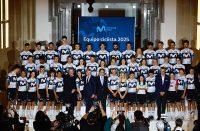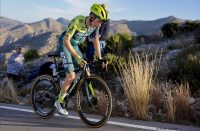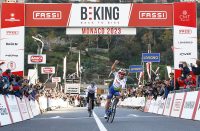Victorious in 2008, 2012 and 2014, and one of the world’s best stage racers, Alberto Contador is aiming for a fourth success at his home Grand Tour, La Vuelta a España. After his disappointment at withdrawing from the Tour de France, his primary goal of the season, due to injury, Alberto soon refocused his targets on the third Grand Tour of the season.

Alberto crashed on both the first and second stages of the Tour de France, but battled on through the first week before finally succumbing to injury and illness as a result of his falls, stepping off the bike on stage 9. However, in his usual fighting spirit he was back racing at the Clasica San Sebastian and, soon after, at the Vuelta a Burgos where he took the overall race victory with a powerful climbing performance on the final stage.
All of his bad luck is now behind him and Contador focuses only on his next challenge. “Certainly, my goal at the Vuelta is to fight for victory. That’s the idea with which I am going to Galicia, we will then see if we can achieve it, because I will have to face very strong opponents with powerful squads. We will have to take it day-by-day and I just hope I’m a little bit luckier to enjoy the race and the fans. At the Vuelta, the affection of the public has always been amazing and reliving that is something I look forward to. Furthermore, this will be my last Grand Tour with Tinkoff and I would like to finish it in the best way.”
Joining Tinkoff’s GC captain at the race is a team that will boast both a wealth of experience, and also a host of talent capable of supporting their captain across all the terrains that lie ahead. The Spaniard will be assisted in the mountains and on the shallower climbs by Jesús Hernández, Robert Kiserlovski, Sergio Paulinho and Ivan Rovny. For the flatter and intermediate stages, the team also has Daniele Bennati, Manuele Boaro, Michael Gogl and Yuri Trofimov to count on.
“It’s obvious that we have only one leader at the race, that’s Alberto,” explained Sport Director Steven De Jongh when discussing the line-up for the race. “After his crash in the Tour he came back quite well in Burgos – he took the win but still had to work a bit on his condition which is what he’s been doing since, followed by some rest days. I think he can do a great race here – it will be a strong field with the likes of Froome, Quintana, Kruiswijk and Chaves but we’re ready.
“We’ve got a balanced team around Alberto and I think being so clear with one goal, it’s clear for the riders what their focus is. They can be part of something special at the last Grand Tour for Tinkoff, so hopefully we can finish well.
“We have Bennati, Boaro, Gogl, and Paulinho who can support really well on the less hard days, with Paulinho also a strong rider for the hills. Then we have Kiserlovski, Hernández, Rovny and Trofimov who can do their bit in the mountains.”
The race gets underway on Saturday 20th August with a team time trial around the Castrelo de Miño reservoir, before coming to a close three weeks later on Sunday 11th September with a sprinters’ showdown in the country’s capital, Madrid. The race includes no less than 10 summit finishes, including the infamous climb of the Lagos de Covadonga – an average gradient of 7.3% over its 12.6km distance. Other key summit finishes include the stage eight climb of La Camperona, and also the Col d’Aubisque on stage 14.
De Jongh continues: “There are ten mountain top finishes this year and we hope to pick up a stage win along the way. To pin-point some of the key stages, there’s the finish up the Col d’Aubisque and also stage 20 – I think those two can be critical, but there’s a lot of hard stages and like always it will be a really hard Vuelta. The weather can also play its part so you have to take it day-by-day as every stage can bring a surprise.”
The race offers at least five fast finishes, but as often happens at La Vuelta, the uncategorised climbs can also catch out the fast men. After the opening team time trial, there’s just the one other effort against the clock, with a 37km individual effort on stage 19, just two days before the 2016 Vuelta a España champion will be crowned.
Alberto Contador’s full statement on the race and his ambitions was issued on Tuesday and can be found here.
The Race
Stage 1: Balneario Laias – Parque Nàutico de Castrelo de Miño, 27.8km TTT
The opening stage of the Vuelta sees a team time trial decide the first race leader, as has become custom at the Spanish Grand Tour. The near 30km parcours covers a flat route that will see all 22 teams of nine riders pace themselves to try to secure the first red jersey of the race.
Stage 2: Ourense – Baiona, 160.8km
The second stage sees the first climb of the race, with a third category ascent falling mid-way through the stage. The Alto de Fontéria climbs up to 790m altitude before descending back down for nearly 20km, with the race then tackling three short hills before the finish that could see the fast riders battle out the win.
Stage 3: Marín – Mirador de Ízaro, 176.4km
The first hill-top finish of the race falls on just the third stage, with a short, sharp climb to the line. The finish comes after two other categorised climbs, the latter summiting just over 20km from the line, offering a tough finish to the race.
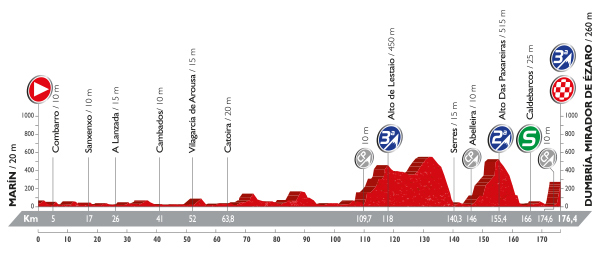
Stage 4: Betanzos – San Andrés de Teixido, 163.5km
A second summit finish in two days on stage 4, as the GC favourites will once again need to be alert to the dangers of riders going clear. The second category finishing climb comes in two parts, and is the third of three climbs on the stage.
Stage 5: Viveiro – Lugo, 171.3km
A sprint is expected for stage five, despite a difficult climb to navigate just over halfway through the stage as the climb should be tackled by the day’s break, with the GC fight nullified behind.
Stage 6: Monforte de Lemos – Luintra, 163km
The sixth stage of the Vuelta has breakaway written all over it. With a succession of climbs, often uncategorised, coming in the second half of the stage, a concerted chase will be difficult to maintain, while the sprinters will struggle to hold onto the pace.
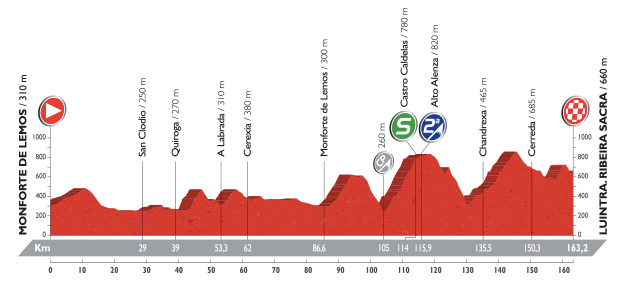
Stage 7: Maceda – Puebla de Sanabria, 158.5km
Heading towards the border with Portugal, stage 7 features three categorised climbs along its rolling route with a long, steady descent to the finish after the final climb. It could be a day for the breakaway, or for a reduced bunch to fight out the stage win amongst themselves.
Stage 8: Villalpando – La Camperona, 177km
Another summit finish decides stage 8, but after a near flat stage up until the base of the climb. The Alto de la Camperona climbs up to 1600m altitude and will be another test for the GC favourites on this, a stage for the real climbers.
Stage 9: Cisterna – Naranco, 164.5km
Stage 9 spends the first third at over 1000m altitude before starting a long descent that follows the day’s first categorised climb after 64km. There are still five other climbs to tackle in the final 55km, four categorised, with the final one being the uphill climb to the line.
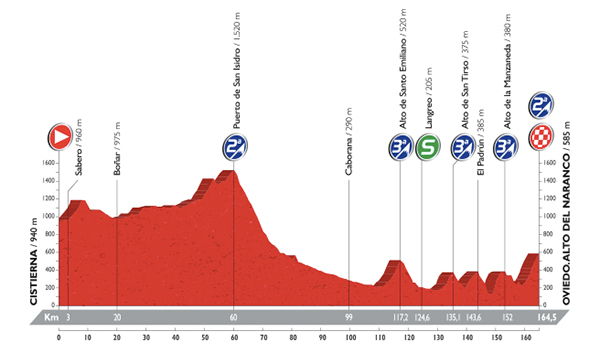
Stage 10: Lugones – Lagos de Covadonga, 188.7km
The day before the first rest day of the race sees yet another summit finish, taking in the Esp. categorised climb (hors categorie) up to the Lakes of Covadonga at over 1100m altitude. The climb is preceded by another tough ascent with 40km to race, so we can expect fireworks today.
Stage 11: Colunga. Museo Jurásico – Pena Cabarga, 168.6km
As the race heads into its second half, there’s little change with the style of stage-end we see on stage 11, with another mountain-top finish closing out the day. The mainly flat parcours up until the base of the climb will lull the peloton into a false sense of security, but as the gradients slope upwards, the day’s selection will soon be made.
Stage 12: Corrales de Buelna – Bilbao, 193.2km
Four categorised climbs are to be tackled on stage 12, before a descent to the line in Bilbao. With the final climb cresting 13km from the finish, this could be the catalyst for the stage-winning attacks.
Stage 13: Bilbao – Urdax, 212.8km
The thirteenth stage, unlucky for some, will pass into France for the first time this race, and should provide the sprinters with a somewhat rare opportunity for a stage win – if they can conquer the succession of climbs in the middle of the stage.
Stage 14: Urdax – Col d’Aubisque, 196km
After a brief foray into neighbouring France yesterday, stage 14 will spend nearly its entirety on French roads, coming to a close on the well-known Col d’Aubisque, the fourth of the day’s tough, testing climbs on what will be a very decisive GC day at the race.
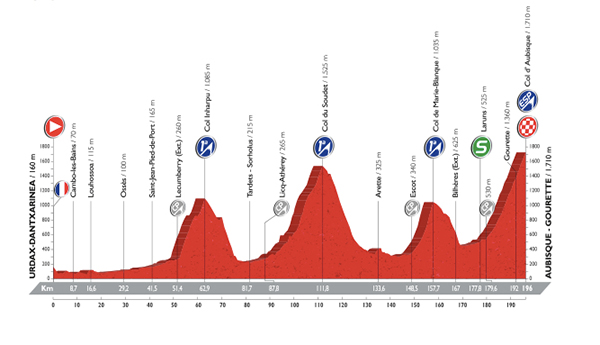
Stage 15: Sabiñánigo – Formigal, 118.5km
After yesterday’s tough mountain stage, the difficulty continues on stage 15 on one of the shortest road stages of the race. Two short categorised climbs fall either side of the mid-way point, before a long climb to the finish line in Formigal.
Stage 16: Alcañiz – Peñicola, 158km
After a succession of very tough stages, the riders will welcome the sight of stage 16 with a long gradual drag for nearly 90km, before a long downhill and then a flat 20km to finish. Presuming the sprinters survive the opening drag, they will have another shot at victory today.
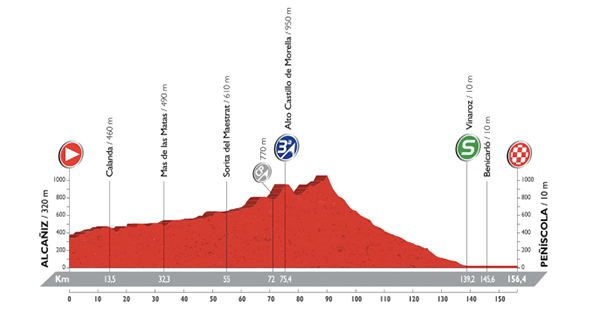
Stage 17: Castellón – Mas de la Costa, 173.3km
Following the second rest day of the race, stage 17 sees a tough start with the day’s first climb starting after just 10km, cresting 10km later. A rolling route over two more categorised ascents follows before the fourth climb of the day to the finish line atop the Alto Mas de la Costa.
Stage 18: Requena – Gandia, 191km
A rolling stage that sees more descent than ascent, stage 18 will be a day for the fast men that are left in the race – unless these are so few and far between that the breakaway will prove stronger than the chase.
Stage 19: Jávea – Calpe, 39km ITT
The only individual time trial of the race, stage 19 races across a fast, mainly flat, route which will suit the larger time triallists. This will be one of the last chances at the race for some riders to make a difference, and we could see a late shake up in GC.
Stage 20: Benidorm – Alto di Aitana, 193.2km
A punishing profile faces the riders on this the penultimate road stage of the race, with five categorised climbs to tackle – four second category ascents spread during the stage, and a final Esp. category climb to the line. One for the climbers, the GC battle could be decided today.
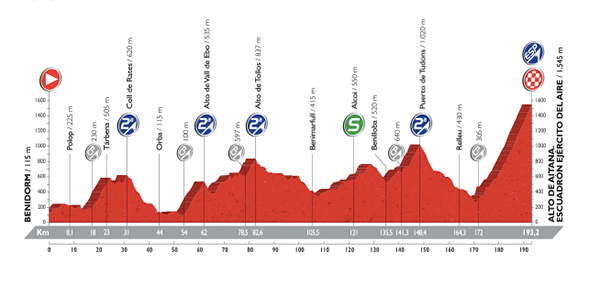
Stage 21: Las Rozas – Madrid, 104.1km
The final stage of La Vuelta is a procession into the Spanish capital to round out this year’s race, the third and final Grand Tour of the season. The sprinters that are left in the race will have one final shot at victory here on this fast, flat run-in after which the final race winner will be crowned.

